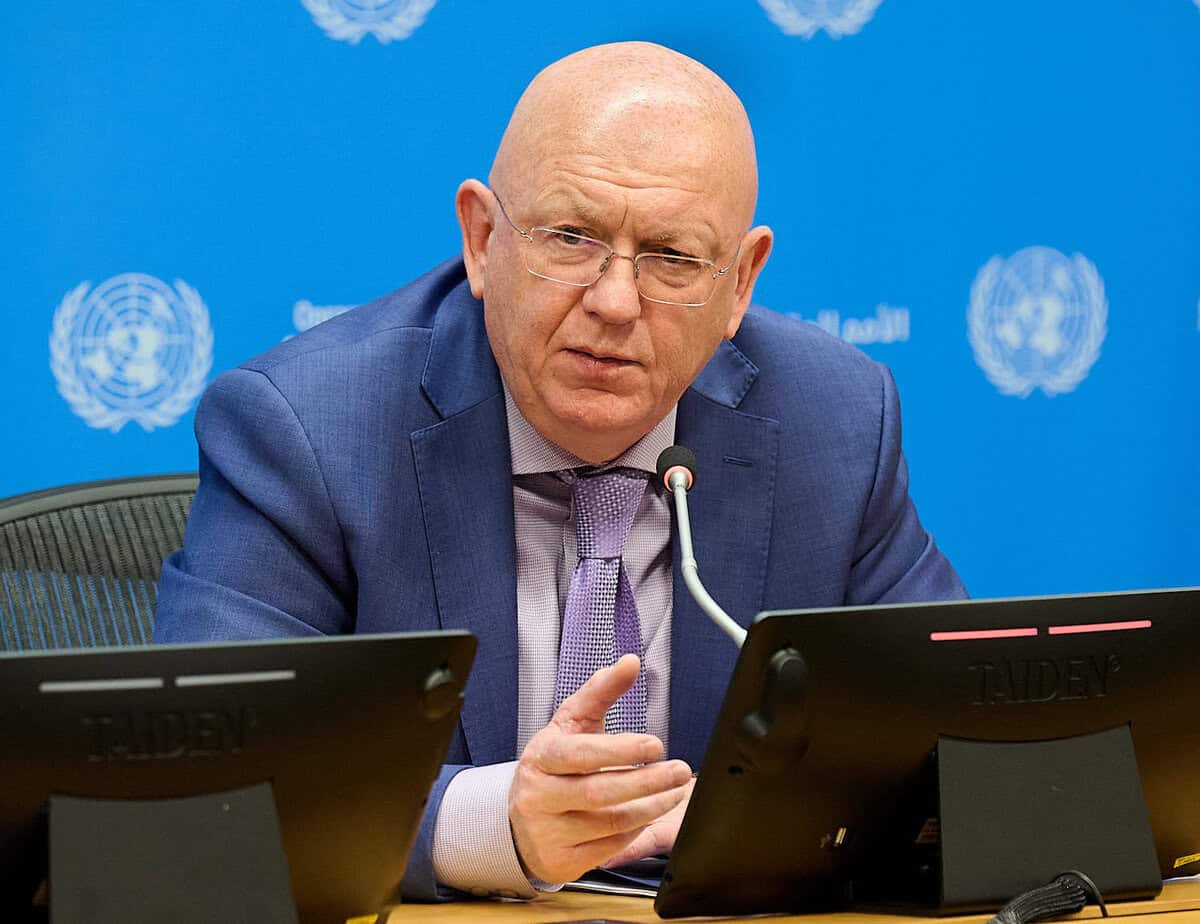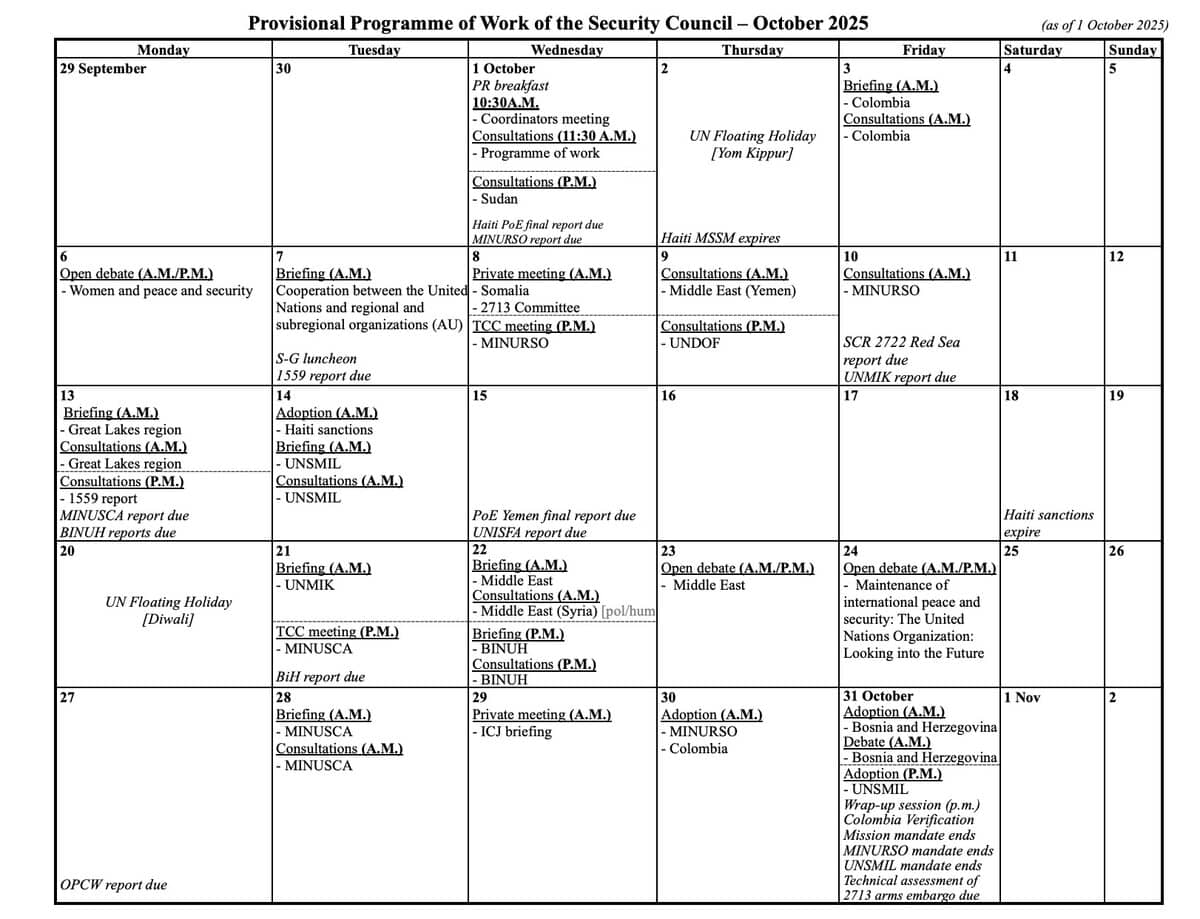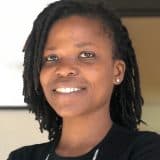 Vassily Nebenzia, permanent representative of Russia to the UN, is rotating president of the Security Council in October. He brushed aside questions from journalists about the US demanding that Europe raise its defense spending, instead calling European leaders “dwarves” in comparison with former statesmen like Churchill, Oct. 1, 2025. JOHN PENNEY/PASSBLUE
Vassily Nebenzia, permanent representative of Russia to the UN, is rotating president of the Security Council in October. He brushed aside questions from journalists about the US demanding that Europe raise its defense spending, instead calling European leaders “dwarves” in comparison with former statesmen like Churchill, Oct. 1, 2025. JOHN PENNEY/PASSBLUE
As Russia assumed the rotating presidency of the United Nations Security Council for October, some of its top diplomats recently praised United States President Trump while scorning Moscow’s European neighbors.
Foreign Minister Sergey Lavrov and Vassily Nebenzia, Russia’s permanent representative to the UN, both hailed Trump’s willingness for what the characterized an honest dialogue while accusing the collective European governments of warmongering and subservience to Washington.
At separate media briefings held during and right after the high-level week of the General Assembly, both Russians criticized European governments for relying on US guidance for their diplomatic direction, particularly the war in Ukraine, noting that Europe had forfeited diplomacy by bulking up its war arsenal.
“When some of our European colleagues turn diplomacy either into courting their counterparts from Washington to keep them engaged in ‘Joe Biden’s war,’ the war on Ukraine or substitute diplomacy with sanctions, it is a path with no prospects that will not bring any success,” Lavrov told journalists after his speech to the 80th UN General Assembly debate, on Sept. 27.
“On the contrary,” he added, “we are ready for an honest dialogue on any issue, which, as we see, the United States is also ready for.” Although he was not specific, Lavrov was probably referring to the meeting that Trump held with President Vladimir Putin in Alaska in August.
On Oct. 1, speaking to the media, Nebenzia also downplayed Trump’s threat to impose additional sanctions on Russia. Both he and his boss, Lavrov, acted unfazed by reports that Washington had approved the transfer of Tomahawk cruise missiles to Ukraine or by the US call for India to reduce Russian oil purchases. Much of Nebenzia’s briefing focused on geopolitical matters outside the topic of Russia’s war in Ukraine, which sees no end in sight.
As Lavrov said, “In diplomacy and, particularly public diplomacy, many things can be said based on the specific moment. There are many such moments and the specifics are constantly changing.”
Since his first term as president, Trump has repeatedly called on NATO allies to increase their percentage of GDP spending on their respective militaries. Trump said America would impose major sanctions on Russia if other NATO members did the same. He asked NATO members to stop buying oil from Russia, saying it was counterproductive to efforts to end the war in Ukraine.
European countries have responded to the call for spending more on their militaries by raising the number of army reservists and allocating more money to relevant budgets. Germany, for example, loosened its constitutional debt brakes — or government borrowing limits — in March 2025, allowing it to spend heavily on defense.
France announced in November 2022 that it would raise the number of reservists to 100,000, one for every two active members of the military. The increased recruitment and training of reservists and other rearmament plans means France will spend $64 billion on its military by 2027, a nearly 20 percent jump from 2022. Britain has committed to increasing military spending to 2.5 percent of GDP by 2027 and 3 percent in its next parliament, pending economic conditions.
In 2018, during his first term, Trump asked NATO allies to increase the finances of their respective armed forces by 2 percent of GDP and said they must eventually double it. Since he returned to office this year, his demand has risen to 5 percent. NATO has committed to upping military spending to 3.5 percent by 2035.
But at the two recent press briefings held separately at the UN in New York City by Lavrov and Nebenzia, both diplomats played down Trump’s big push for a more robust NATO. Instead, Nebenzia described European leaders as “dwarves,” compared with past statesmen like Winston Churchill, the former British prime minister. “Besides everything, they stupidly refuse to engage with Russia, thinking they can solve it themselves,” Nebenzia said. “But they are not solving it themselves. They’re still looking across the ocean.”
Lavrov called out Germany’s expanded defense spending as historically reckless. “For a country bearing responsibility for the crimes of Nazism and fascism to re-emerge as a great military power signifies a serious atrophy of historical memory,” he said.
Russia’s criticism of Europe extends to the “snapback” of UN sanctions against Iran under Security Council Resolution 2231, triggered on Sept. 27 after a South Korean-led draft text failed to win enough votes in the Council a week earlier to stop the embargoes from being reimposed on Iran. Moscow and Beijing maintain that the snapback is illegal under international law. They submitted their own draft text to a vote on Sept. 26 to extend the mandate of Resolution 2231 but that also failed.
Nebenzia told reporters that Britain, France and Germany (E3), the European parties to the the Iran nuclear deal (along with China and Russia), heeded the preference of the US to trigger the Joint Comprehensive Plan of Action, or JCPOA, snapback when they initiated the process on Aug. 28. That began a 30-day window for Iran to negotiate concerns with the E3 over the country’s nuclear program.
He added that the European “troika” had been close to a deal with Iran, but when the US interfered, they immediately changed course. The Trump administration withdrew from the deal in 2018, giving Iran an excuse to breach its compliance with the JCPOA and preventing the US from invoking the snapback itself.
“Iran was engaged in intensive consultations with the Euro troika” before the snapback was triggered, Nebenzia said, referring to consultations between the E3 countries and Iran on the return of IAEA inspectors to its nuclear sites after the US-Israeli attacks in Iran in June. “They were very close to a deal, but then they were told ‘no’ by a certain former participant of the JCPOA. The country that committed the original sin in 2018. The Europeans simply said, ‘Yes, sir,’ and everything collapsed.”
Moreover, he told reporters on Oct. 1: “We do not recognize this ‘snapback’ as coming into force.” He added that Resolution 2231 ends on Oct. 18, 2025, “as it was envisaged to expire.”
When Trump quit the JCPOA in 2018, the US imposed a strict regime of sanctions on Iran. The nuclear deal was signed by Britain, China, France, Germany, Russia and the US with Iran in 2015, committing the latter to a strict program of nonenrichment of nuclear energy for military use.
Moscow warned Secretary-General António Guterres against rushing to implement the UN sanctions under the snapback, Nebenzia said, noting that the resolution “has obvious legal flaws, which we’ve been stressing all the time.” Yet, on Sept. 28, the UN released a sanctions list applied to relevant individuals and entities.
 The UN Security Council provisional program of work. For the annual women, peace and security debate, Oct. 6, one briefer was Noura Erakat, a Palestinian-American legal advocate. She referred to Israel’s actions in Gaza as “genocide” to which the US called the accusation “categorically false.”
The UN Security Council provisional program of work. For the annual women, peace and security debate, Oct. 6, one briefer was Noura Erakat, a Palestinian-American legal advocate. She referred to Israel’s actions in Gaza as “genocide” to which the US called the accusation “categorically false.”
Each month, PassBlue profiles UN ambassadors as their countries assume the Council presidency. Russia declined the interview.
Ambassador to the UN: Vassily Nebenzia
Since: 2017
Languages: Russian, English and Spanish
Education: B.A. in law, Moscow State Institute of International Relations
His story, briefly: Nebenzia, 63, was born in Volgograd, formerly Stalingrad, to a father who was a local Communist Party propagandist. Young Nebenzia joined the Soviet foreign ministry the year he graduated from the prestigious Moscow State Institute of International Relations, in 1983. (Lavrov is also a graduate of the institute, which in the past was mainly reserved for families of high-ranking Communist Party members.) Nebenzia has served in various positions in the ministry, including as the director of the Department for International Organizations.
He held the post for eight years before being appointed in 2014 as Russia’s deputy permanent representative to the UN in Geneva. In July 2017, he was named as the permanent representative at the UN in New York City, succeeding Vitaly Churkin, who died suddenly in February that year at age 64. In this role, Nebenzia represents Russia not only in the Security Council but also in other main UN bodies at New York City headquarters.
Nebenzia is married to Lyudmila Kasintseva, and they have one child, Sergey, born in 1994. Nebenzia retreats on weekends to the Russian-owned stone-walled mansion, Killenworth, in Glen Cove, N.Y., overlooking the Long Island Sound, in Gatsby country but next-door neighbor to a nursing home and a YMCA. A Ukrainian Catholic monastery is down the road, set in a similar-era stone mansion.
Nebenzia is due to retire in 2027, at age 65, unless he is named ambassador to another post or appointed to a cabinet position in Moscow. He has been the UN envoy since 2017. Lavrov, a former UN envoy, is 75 years old.
Country Profile
Head of State: President Vladimir Putin
Foreign Affairs Minister: Sergey Lavrov
Type of Government: Semipresidential
Year Russia (Soviet Union) Joined the UN: 1945
Years on the Security Council: Russia is a permanent member, along with Britain, China, France and the US
Population: 143.5 million
Carbon emissions: 13.0 tons; world average of CO2 emissions per person: 4.7 tons (2023)
We welcome your comments on this article.. What are your thoughts?Thank you for reading this article. We hope you will consider donating to PassBlue, an independent, nonprofit media site that covers the UN and global affairs. Your donation will help us hold the powerful to account.

Damilola Banjo is an award-winning staff reporter for PassBlue who has covered a wide range of topics, from Africa-centered stories to gender equality to UN peacekeeping and US-UN relations. She also oversees all video production for PassBlue. She was a Dag Hammarskjold fellow in 2023 and a Pulitzer Center postgraduate fellow in 2021. She was part of the BBC Africa team that produced the Emmy-nominated documentary, “Sex for Grades.” In addition, she worked for WFAE, an NPR affiliate in Charlotte, N.C. Banjo has a master’s of science degree from the Columbia University Graduate School of Journalism and an undergraduate degree from the University of Ibadan in Nigeria.
